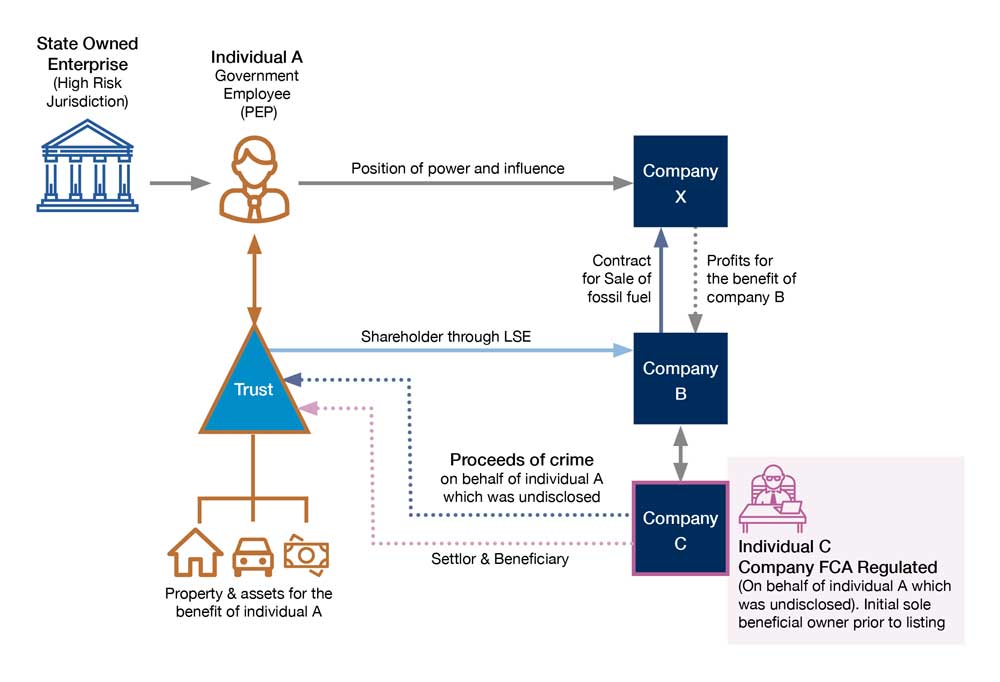Chairman of state-owned company, individual A is a Politically Exposed Person (PEP) due to their position held in government. Individual A entered into a contract on behalf of their government (high-risk Jurisdiction) to sell fossil fuels with a foreign investment company, Company X. Shortly after the contract was agreed, it was cancelled by individual A on behalf of the government. At this time individual A entered into a private contract to sell the material to Company X, via a newly incorporated Jersey company, Company B. The Beneficial Owners (BOs) of the company B were listed as an investment management company, Company C, who are approved in the UK by the FCA, (as a nominee for individual A).
The new contract offered a low price for the material over a long period.
Company C could potentially be a Professional Enabler acting as a front for the real BO- individual A.
Company B was listed on the London Stock Exchange (LSE) and shares sold to unsuspecting shareholders, the stock of Fossil Fuels was restricted by A to create a demand which resulted in a substantial increase in share price.
Individual A has established a trust in Jersey, which has purchased real estate in UK and European jurisdictions using proceeds of crime. Company C is the sole beneficiary and settlor of the trust.

Bribery is the act of offering, giving, receiving, or soliciting something of value as a means to influence the actions of an individual in a position of authority. This can involve cash payments, gifts, services, or other forms of compensation. It typically occurs in situations where the recipient is expected to provide a benefit in return, such as favorable treatment, contracts, or legal judgments.
Bribery is prevalent in many spheres, including politics, business, and various levels of government. It distorts free markets and can lead to situations where decisions are made based on personal gain rather than merit or public interest. The consequences of bribery can be profound, leading to unfair advantages, damaged reputations, and legal ramifications for both the giver and receiver.
Corruption encompasses a broader range of unethical behaviors that abuse positions of power for personal gain. While bribery is one form of corruption, it also includes practices such as nepotism (favoring relatives or friends by giving them jobs), cronyism (favoring friends or associates in political or business decisions), fraud, embezzlement, and the manipulation of regulations to benefit oneself at the expense of the greater good.
Corruption can occur in both the public and private sectors and often leads to severe societal consequences, including the erosion of trust in institutions, increased inequality, and stagnated economic growth. When officials engage in corrupt behavior, it can hinder the effectiveness of government functions, resulting in poorer quality public services and infrastructure. Additionally, corruption can deter foreign investment, increase risks in business operations, and perpetuate cycles of poverty and disenfranchisement in communities.
Both bribery and corruption are detrimental to society and necessitate robust legal frameworks and ethical standards to combat their prevalence and restore integrity in institutions.
We continually strive to enhance the quality of the products we produce, from our typologies to reports, Insight papers to training guides. However, we can only improve if you share your feedback with us about what you think about them. This is your chance to let us know and we appreciate it your feedback. Click the navy button below or scan the QR code.
Tell us what you think >.svg)